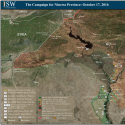 |
 |
Iraq Launches the Campaign for Mosul

Iraqi and regional actors are preparing to assist with or spoil the Iraqi Security Forces’ (ISF) operation to retake Mosul and its environs from ISIS. Prime Minister Haidar al-Abadi announced the start of operations to retake the city on October 17. The ISF began shelling ISIS-held villages south of Mosul, Iraqi Army armored units and Federal Police advanced towards Mosul near Gwer, southeast of Mosul, and Peshmerga units began advancing towards Mosul from Khazar, east of Mosul. The ISF’s operation against ISIS will require security forces to isolate Mosul before it can begin a block-by-block clearing operation in the city itself. The ISF recaptured Shirqat, the last major ISIS-held city on the Mosul-Baghdad highway, on September 22, thereby setting the operational conditions to launch operations for Mosul. The ISF will need to continue its line of effort up the highway while also encircling the city from the north and northeast. ISIS will seek to conduct attrition warfare against the ISF before it arrives in Mosul, leveraging its remaining lines of communication in Anbar, Ninewa, and Syria to shift people and supplies. ISIS will also use the sparsely populated areas on both the eastern and western sides of the Tigris River to launch attacks against recaptured areas and the ISF.
The ISF does not have the force size to take both the city and its environs on its own. Consequently, although the ISF will lead the operations into the city proper, they will need to cooperate with the Kurdish Peshmerga, who hold the majority of terrain surrounding the city. However, the Peshmerga participating in anti-ISIS operations will likely exploit the opportunity to take control of areas by displacing Sunni Arabs from their homes, as they did following operations in Sinjar in November 2015.
The shortage of manpower also leaves a gap for Iranian-backed Shi’a militias, which will likely follow the ISF as they clear the cities and remain as a part of the holding force, as they have already done in Shirqat. The Popular Mobilization reported on October 10 that militias are moving to the Ninewa provincial border to participate. Unnamed commanders from Kata’ib Hezbollah (KH) and Asa’ib Ahl al-Haq (AAH), two Iranian proxies with a record of sectarian violence, reported on October 13 that more than 2,000 of their fighters withdrew from Syria, mostly from Aleppo, to redeploy to Mosul as well as Hawija. The deployments were followed by two high level meetings indicating heavy Iranian proxy participation in the operation. On October 15, PM Abadi received senior Iranian proxy militia commanders, including Badr Organization leader Hadi al-Amiri, AAH leader Qais al-Khazali, Harakat al-Nujaba leader Akram al-Kaabi, and Kata’ib Sayyid al-Shuhada (KSAS) leader Abu Alaa to discuss Mosul and Hawija operations. A day later, images circulated of Islamic Revolutionary Guard Corps-Quds Force (IRGC-QF) commander Qassem Suleimani visiting an undisclosed location with Amiri and senior Popular Mobilization commander and U.S.-designated terrorist Abu Mahdi al-Muhandis (Unsafe link – do not visit). Iranian proxy involvement in the operation opens up the possibility of sectarian violence against the 1.2 to 1.5 million civilians estimated to flee the Mosul area.
Actors outside of Iraq are positioning themselves for the operation as well. Turkey has insisted that it reserves the right to intervene in northern Iraq if Mosul operations fail to go its way. There are Turkish forces inside Iraq already, and Turkish President Recep Erdogan has increased Turkish forces along the Iraqi border ostensibly to defend against the Kurdistan Workers’ Party (PKK). Erdogan also announced that Turkey is actively participating in Mosul operations following PM Abadi’s announcement of operations, which could open up conflict with Iraqi Shi’a militias who vow to attack Turkish forces.
The operation to retake Mosul is resulting in a dangerous convergence of Shi’a, Turkish, and Kurdish actors as they jockey for influence in northern Iraq. Iranian proxy militias appear set to play a major role in the operation. A multi-party sectarian, ethnic, and international conflict will likely give opportunities to ISIS and other Sunni insurgent groups, such as the Baathist group Jaysh Rijal al-Tariqa al-Naqshbandia (JRTN), to reconstitute after areas have been cleared.